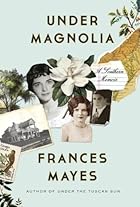Although her childhood was not a happy one and her family was dysfunctional, Frances Mayes could not escape the South that was bred into her very bones. Living in California and Italy, she still felt pulled to the South, especially after uncovering a collection of memories written long ago and long since set aside. And so she convinces her husband to move from California to North Carolina, to the land of her ancestors and if not exactly the land of her memories, close enough.
The youngest of three daughters by a good margin, Mayes grew up in the midst of her parents' constant battles, unaware that happier childhoods were to be had. Her father died young, leaving her mother and her dependent on her cantankerous grandfather's charity, after, at least for her mother, a lifetime of wealth. Mayes was left alone much of the time, stubborn as a mule, and determined to do as she pleased. And even as she grew and matured and society changed in massive and monumental ways, she rebelled against the only upbringing she knew, her biggest life goal to escape Fitzgerald as her mother never did.
Each of the chapters in the book is really a short essay strung together with the other essays to form a snapshot of her growing up years. They are arranged mostly chronologically, telling of her early life as scrap of memory after scrap of memory. The writing is descriptive and lyrical and it is clear that Mayes is a poet heavily influenced by the natural world around her. As each chapter follows on the previous one, the writing lulls the reader into stifling, heavy peach scented memories weighted with heat and humidity and dysfunction. It is somehow not a traditional memoir, grounded so heavily as it is in the physical description of place and the attitudes that pervaded that small town. And the reading of it is thick and slow, as only a southern summer day can be. But that Mayes both escaped Fitzgerald and is forever rooted in the South is evident in every honestly felt word of the book.
Thanks to LibraryThing Early Reviewers for sending me a copy of this book for review.







No comments:
Post a Comment
I have had to disable the anonymous comment option to cut down on the spam and I apologize to those of you for whom this makes commenting a chore. I hope you'll still opt to leave me your thoughts. I love to hear what you think, especially so I know I'm not just whistling into the wind here at my computer.